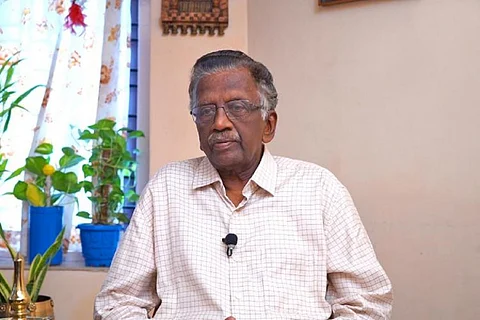

The presence of Kerala Lokayukta Justice Cyriac Joseph and Upa Lokayukta Justice Harun-Ul-Rashid at an Iftar party hosted by Chief Minister Pinarayi Vijayan on April 4 at Thiruvananthapuram has raised many eyebrows. A case related to the alleged misuse of the Chief Minister's Distress Relief Fund (CMDRF) is pending before the Lokayukta, and in this context, the propriety of Cyriac Joseph and Harun-Ul-Rashid attending such a function as guests of the CM is becoming a point of debate. The Lokayukta – a statutory anti-corruption body that investigates allegations of malpractices against public servants – referred the case to a full bench on March 31 in the wake of a split verdict by a two-judge bench.
Speaking to TNM, RS Sasikumar, the petitioner in the case, said that he has now lost faith in the process and is skeptical of getting a fair judgement. “How should I, as the petitioner in the case, or a citizen of the society in general, view the Lokayukta judges attending the iftar party hosted by the CM and having friendly talks with him, when the case has been referred to a full bench?” he asked. Sasikumar, who is the Chairman of the Save University Campaign Committee, a whistleblower group that has been exposing discrepancies in the appointment of teachers in universities, also said that one can never call attending an Iftar party hosted by the government wrong because that is a secular act, above religion or caste.
“Why it became a controversy here is because they (the Lokayukta and Upa Lokayukta) lacked propriety. Propriety is of utmost importance for anyone be it a Prime Minister or a Chief Minister or an employee of the lowest grade. This quality must be developed through the ability to use discretion. A judge can pronounce the verdict either in favour of the petitioner or the accused. But the judge has the obligation to convince the public that the verdict was passed without any favour to any side. Here, that fairness has been lost,” he said.
He further added that of the Lokayukta members who attended the Iftar, one was a Supreme Court judge and the other was a High Court judge. “The Supreme Court adopted ‘Restatement of Values of Judicial Life’, on 7 May 1997. (It is a code of judicial ethics and serves as a guide for moulding an independent and fair judiciary) The tenth clause of it clearly says that a judge shall not accept gifts, or hospitality except from his family, close relatives, or friends. Are the Lokayukta members who attended the Iftar party of the CM his friends or close relatives? They should have abstained from attending it. This was a strategy to get the pleasure of those in power,” he said, underlining that now he doubts if he would get justice as the petitioner in the case.
Elaborating on his apprehensions, Sasikumar said, “Lokayukta members might have attended Iftar gatherings hosted by political parties in the past too. But this time it is different. The Lokayukta is the highest authority to check corruption, and now I don’t believe that the judgement will be fair. Neither I nor the public now believes that the judges have the rectitude to write a judgement against the CM. The judgement is likely to be in favour of the CM. If the judiciary loses fairness, it will be controlled by the executive. Where will ordinary people get justice then?”
Sasikumar also pointed out that in recent times there is a tendency for judges to deliver judgements in favour of the ruling government at the fag end of their career. “After retirement, they get appointed in bodies like this. Now I remember a speech by the late Arun Jaitley in the parliament that retired judges should not be reposted if their judgements at the end of their careers are in favour of ruling governments. If the judiciary budges to such influences, there won’t be anyone left to question the state becoming a mafia raj,” he added.